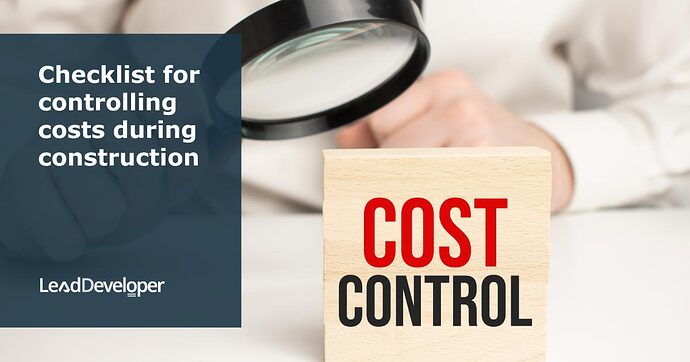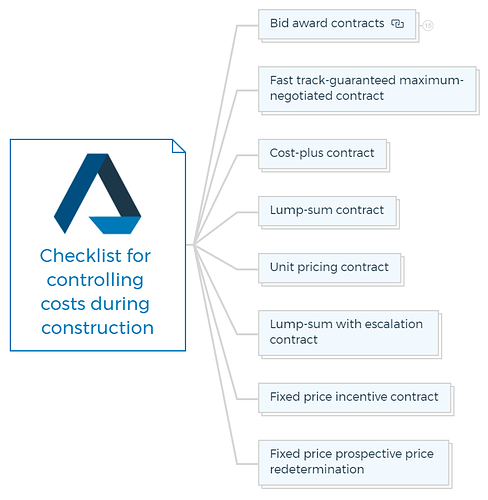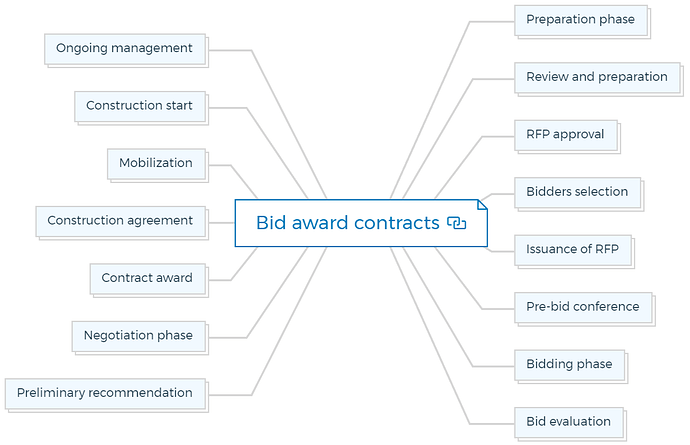Checklist for controlling costs during construction
1. Bid award contracts
1.1 Preparation phase
- Identify potential bidders based on their qualifications and track record.
- Ensure all necessary project documentation, including plans, specifications, and project scope, are complete and accurate.
1.2. Review and preparation
- Thoroughly review the drawings and specifications to identify any discrepancies or gaps.
- Prepare a comprehensive Request for Proposal (RFP) with detailed instructions, the bid proposal form, and the proposed contract documents.
1.3. RFP (Request for proposal) approval
- Share the draft RFP with relevant stakeholders for review and approval, ensuring clarity and completeness.
1.4. Bidders selection
- Finalize the list of potential bidders invited to participate in the bidding process.
- Consider their expertise, capacity, and alignment with the project’s requirements.
1.5. Issuance of RFP
- Make any necessary revisions to the RFP based on the feedback received during the approval phase.
- Distribute the finalized RFP to the selected bidders, providing a clear timeline for bid submission.
1.6. Pre-bid conference
- Conduct a pre-bid conference to address bidder questions, provide additional information, and clarify any ambiguities in the RFP.
- Promote transparency and a level playing field among all bidders.
1.7. Bidding phase
- Bidders prepare their bids, considering the information in the RFP, project documentation, and discussions during the pre-bid conference.
- Bids should be comprehensive, accurate, and transparent, reflecting a complete understanding of the project’s scope.
1.8. Bid evaluation
- Receive and carefully review the submitted bids to ensure they meet the project’s requirements.
- Evaluate bids based on both cost and the bidder’s ability to deliver quality work within the specified timeline.
1.9. Preliminary recommendation
- Analyze the evaluated bids and make a preliminary recommendation on the most suitable bidder based on cost, quality, and other relevant criteria.
- This step may involve discussions with the project team to align on the best choice.
1.10. Negotiation phase
- Organize a pre-award meeting with the selected bidder to discuss the terms and conditions of the contract.
- Negotiate any necessary modifications to ensure both parties’ expectations are aligned.
1.11. Contract award
- Formally award the contract to the chosen bidder.
- Notify all bidders about the contract award decision, maintaining professionalism and transparency.
1.12. Construction agreement
- Draft the construction agreement detailing the project scope, timeline, payment schedule, and other relevant terms.
- Obtain necessary approvals and signatures from both parties before proceeding.
1.13. Mobilization
- The awarded general contractor prepares to mobilize for the construction phase, ensuring necessary resources, personnel, and equipment are ready.
1.14. Construction start
- Commence the construction activities according to the agreed-upon schedule and project timeline.
- Maintain ongoing communication and monitoring to ensure the project progresses as planned.
1.15. Ongoing management
- Continuously monitor the construction progress and compare it against the established timeline and budget.
- Address any issues or deviations promptly to keep the project on track.
You are missing out if you haven’t yet subscribed to our YouTube channel.
2. Fast track-guaranteed maximum-negotiated contract
- Define the guaranteed maximum price (GMP) to control costs.
- Ensure that all parties understand the GMP and the scope of work.
- Establish a mechanism for change orders and cost adjustments.
- Maintain effective communication to manage any potential cost overruns.
3. Cost-plus contract
- Clearly define the types of costs that are reimbursable.
- Set a cap or maximum limit on reimbursable costs to avoid excessive spending.
- Regularly review and audit cost documentation to ensure accuracy.
- Discuss and agree upon the contractor’s fee structure upfront.
4. Lump-sum contract
- Develop a comprehensive scope of work and specifications.
- Obtain detailed quotes and estimates from contractors before finalizing the contract.
- Include contingency funds to cover unexpected expenses.
- Monitor progress and expenses closely to identify any deviations.
5. Unit pricing contract
- Clearly define the units of measurement and corresponding prices.
- Have a mechanism in place to verify the quantities of work completed.
- Regularly review and verify invoices against the agreed-upon unit prices.
- Ensure that changes in quantities are documented and properly priced.
6. Lump-sum with escalation contract
- Clearly outline the escalation formula or mechanism.
- Define the baseline cost at the start of the contract.
- Monitor the escalation factor and adjust payments accordingly.
- Keep track of economic indicators that influence escalation.
7. Fixed price incentive contract
- Set clear performance targets and metrics for cost savings.
- Define the incentive structure based on achieving or exceeding targets.
- Regularly assess progress toward targets and adjust incentives as needed.
- Ensure that the contract encourages cost-saving measures without compromising quality.
8. Fixed price prospective price redetermination
- Clearly outline the circumstances under which price adjustments can occur.
- Define the process for determining price adjustments, such as using an agreed-upon index.
- Keep accurate records of factors affecting price changes.
- Regularly review and agree upon any price adjustments.



